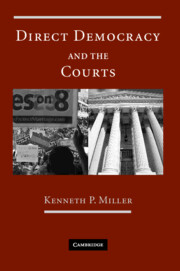Book contents
- Frontmatter
- Contents
- List of Tables and Figures
- Preface
- Introduction: A Clash of Rising Powers
- PART I THE QUEST FOR MAJORITY RULE
- 1 The Epic Debate
- 2 Direct Democracy Gathers Force
- PART II COUNTERING THE MAJORITY
- PART III THE MAJORITY STRIKES BACK
- Conclusion: A New Constitutional Equilibrium
- Appendix: Post-Election Initiative Invalidations
- References
- Index
- References
1 - The Epic Debate
Published online by Cambridge University Press: 05 June 2012
- Frontmatter
- Contents
- List of Tables and Figures
- Preface
- Introduction: A Clash of Rising Powers
- PART I THE QUEST FOR MAJORITY RULE
- 1 The Epic Debate
- 2 Direct Democracy Gathers Force
- PART II COUNTERING THE MAJORITY
- PART III THE MAJORITY STRIKES BACK
- Conclusion: A New Constitutional Equilibrium
- Appendix: Post-Election Initiative Invalidations
- References
- Index
- References
Summary
In lectures at Princeton in 1913, U.S. Senator Elihu Root warned that the Progressive Era's fast-spreading direct democracy movement was threatening major premises of American constitutional design. “[E]ssential principles embodied in the Federal Constitution of 1787, and long followed in the constitutions of all the States, are questioned and denied,” Root said. “The wisdom of the founders of the Republic is disputed and the political ideas which they repudiated are urged for approval.” Although lamenting these developments, Root understood that “[q]uestions of general and permanent importance are seldom finally settled” and that “[p]ostulates…cease to be accepted without proof and the whole controversy in which they were originally established is fought all over again.”
What foundational issues of the 1780s were reformers revisiting at the turn of the twentieth century? What essential principles of American constitutional tradition did they deny? And, which political ideas rejected by the Founders did the reformers now promote? In Senator Root's view, the fundamental issue in both eras was how much power the people should exercise directly. A closer look at the founding era reveals that the Progressive Era advocates of direct democracy were, in fact, reopening an old debate.
THE FOUNDERS' REJECTION OF DIRECT DEMOCRACY
James Madison and the other framers of the federal Constitution flatly rejected direct democracy. Having fought a revolution against monarchy, they were committed to the principle that all legitimate power flows from the people, yet, they feared unchecked popular rule.
- Type
- Chapter
- Information
- Direct Democracy and the Courts , pp. 19 - 40Publisher: Cambridge University PressPrint publication year: 2009
References
- 1
- Cited by



